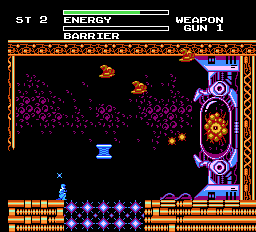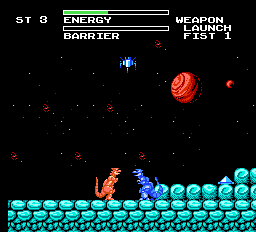Dynowarz
Destruction of Spondylus
System: Nintendo Entertainment System
Review written January, 2007
When Professor Proteus enters a robotic dinosaur vehicle to save his artificial solar system of Spondylus (a story from the manual that, incidentally, is not contained within the game itself), he has made a huge mistake. His machine is a useless, ungainly weapon. He is saved, however, by his enemy's decision to also use ineffectual, clumsy robotic dinosaurs as weapons.
When I was a child, it was popularly believed that dinosaurs were slow, stupid and lumbering cold-blooded lizards, resigned to spend their time motionless in swamps or lakes. Scientists had already theorized that dinosaurs were more mobile, but such views were not widely disseminated until 1993, when fleet footed Tyrannosaurus and Velociraptors were featured in the movie Jurassic Park. Many children are fascinated by dinosaurs and may wish for an opportunity to play as one in a videogame. Unfortunately, Dynowarz, which was released three years before Jurassic Park, is based on the awkward dinosaurs I remember from my childhood.
Alternating stages are played in the dinosaur, while in the remainder, the professor personally infiltrates bases in side view platform shooting stages reminiscent of (but worse than) those in Xexyz. The dinosaur stages are about as bad as possible. Not only does the dinosaur move slowly, its normal attack has no range, many of its special weapons can't hit enemies near the ground, it can only have one (slowly moving) projectile on the screen at once, and it hesitates a bit before jumping. The level design is so lacking, and the dinosaur can absorb so many hits, that there’s little reason to not simply ignore enemies as you trudge past them. The stages have bottomless pits, but they are all of the same width, and none require coordinating jumping while attacking.
The platform shooting stages are infinitesimally better, in that they involve jumping between moving platforms, which is more substantial than anything in the other half of the game. But the professor also has an awkward hesitation before jumping. These stages are only a few screens long, yet several of those screens are reused in multiple stages. Every stage also has the same boss.
The designers of this game seem to be deeply delusional about its quality. Progress can be saved with a password, which is completely unnecessary considering the game is short and easy enough to be beaten in about an hour. More disturbingly, the ending message is, "Congratulations! You've finished another great game from Bandai!" Even in a genuinely great game, such gall would be off putting. Castlevania III ended with a humble, "Thank you for playing", without appending, "but we're sure the pleasure was all yours."

1 Star

